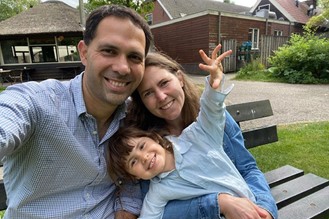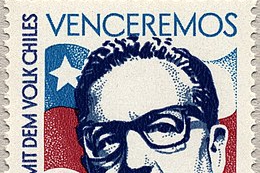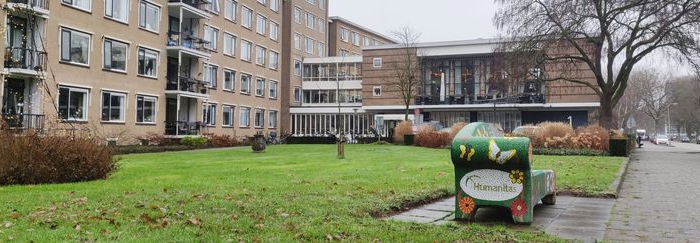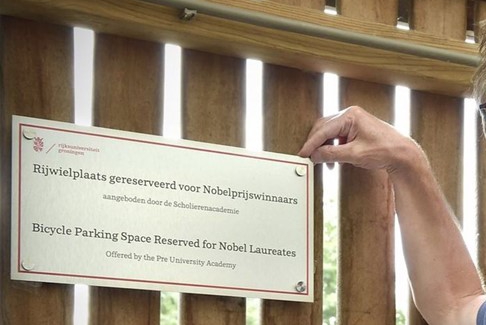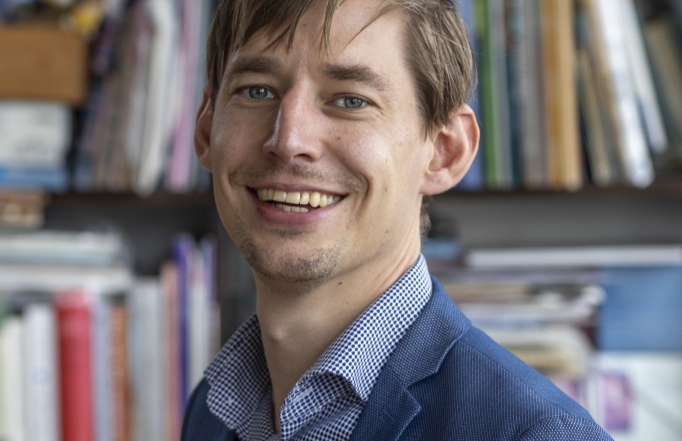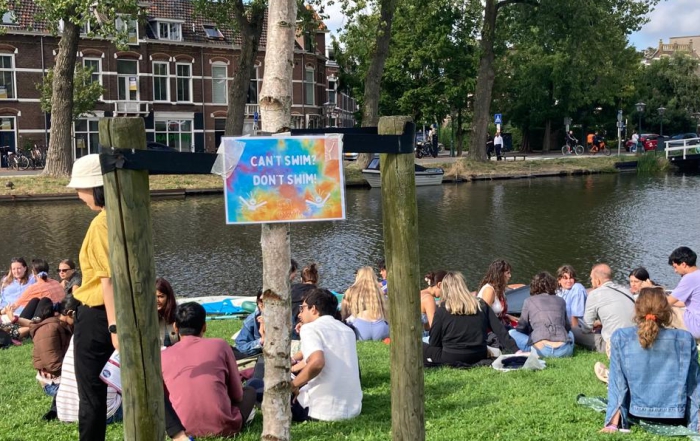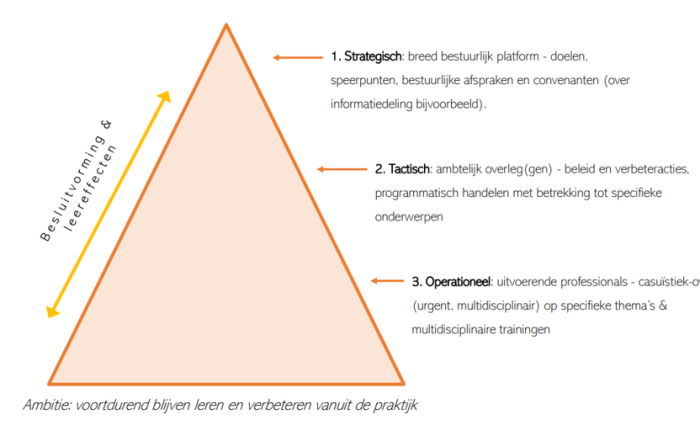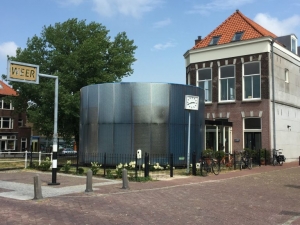Portrait: Between Chile and The Netherlands
By Aart van Bochove and Ute Jansen
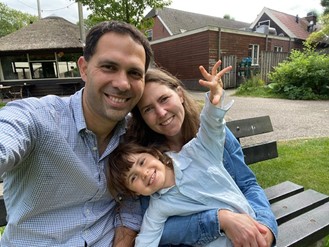
Esteban Szmulewicz, PHD candidate in Leiden, and his family
Leiden is a knowledge hub, together with Utrecht, Groningen, Amsterdam and other cities. Knowledge is a very peculiar commodity. It multiplies when you share it. More talent, more communication, more border crossings: all kinds of effective instruments in building a vital economy. That is why knowledge hubs are developing into international societies. And that is why Blaauwberg used English as working language during its 25th anniversary, in August, 2022.
We were happy to meet Esteban Szmulewicz and his wife Magdalena Palma there. In this newsletter, we introduce Esteban to you, as a very interesting temporary citizen in our city. What made him come to the Netherlands? How does it feel to live as an international in Leiden? And how will this period abroad shape his future in Chile?
Esteban and Magdalena are citizens of the Republic of Chile. Their daily language is Spanish. Esteban is a PHD candidate at the Constitutional and Administrative Law Department of Leiden Law School. His research in Leiden focuses on how decentralized states behave under emergency conditions, particularly the Covid-19 pandemic. He looks at which dynamics (competition, conflict, coordination or cooperation) work better in terms of achieving more effective and legitimate responses to crisis.
Through his research, Esteban came into contact with Leiden University and when the opportunity arose to do his PHD here, he moved with his family to Leiden. A conscious choice: “I wanted to go to a country with a different tradition from my own. And a country with openness towards international researchers. In Germany for example, medium-sized cities are not so easy for foreigners, only the big cities are international. In Leiden, I can switch quickly in my research from Italy to Spain, using the LERU (League of European Research Universities) network, the Latin America Programme or other Regional Studies.”
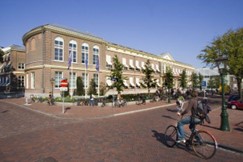
Leiden Law School, Leiden/ The Netherlands
Esteban used to live in London some 15 years ago when he did his master’s in political science at the London School of Economics. “London is great, the centre of the empire, everyone comes to London. That is also true for Toronto, but those cities are expensive, especially if you have a family. As a young family, you have different needs. We didn’t want a big commute, that was clear to us even before the pandemic.”
Leiden seemed to be the right choice. However, when the young family arrived in 2020, the pandemic had just started. That made a tough beginning. We asked him if he felt welcome arriving in the Netherlands. “Yes and no. Yes, because Leiden is an international city and most people speak good English. No, because of the pandemic. In our first year here – 2020 – we lived in isolation. The Blaauwberg event in the summer of 2022 was a big event for us, in fact for Magdalena it was the first big activity outside her networks in the international community of Leiden.”
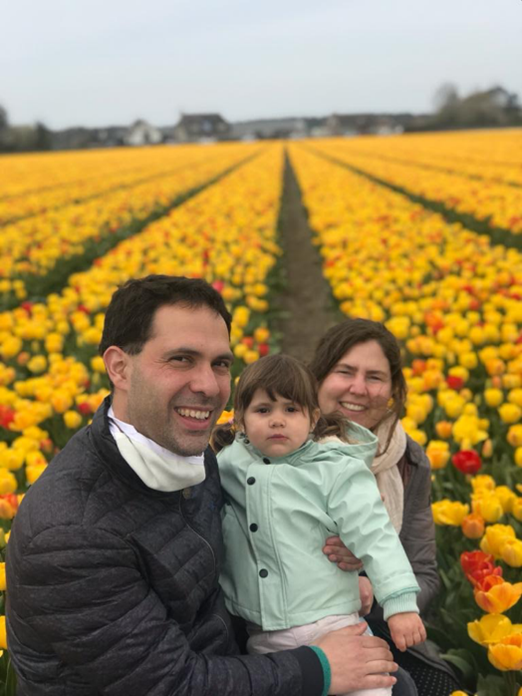
It is easy to link with internationals in Leiden because of the university and the BioScience park. Some stay only for a short time, some longer, such as Esteban and his family who are for four years in the Netherlands. Despite the international climate in Leiden, Esteban realizes the importance of learning the language. “We learned a little bit of Dutch before we came here. Magdalena wanted to work in community services, or with the municipality. For that, you need to have a working command of Dutch. But you do not need it for social encounters and international jobs.”
Once he has finished his PHD in Leiden in 2024, Esteban and his family will return to Chile. He is linked to the Universidad Católica del Norte in where he has been teaching law at the Coquimbo Campus since 2016. His university supported his research abroad and asks in return that he will keep working for at least 5 more years in Coquimbo. This way, he can give back his expertise and experience to the region which is far away from Santiago.
“50% of Chileans live in Santiago, everything happens in the Central Valley. And then you can go 1,000 km south, there are some big universities there, for example, Universidad Austral del Chile in Valdivia. These universities have been around for almost a century, they have well-established international connections. In the North, the situation is different and the Universidad Católica del Norte has plans to work more on its international relations. The North of Chile has enormous resources, including solar energy, and large lithium and copper reserves. There is still a lot to do in terms of technology and regulations, that makes interesting research topics.
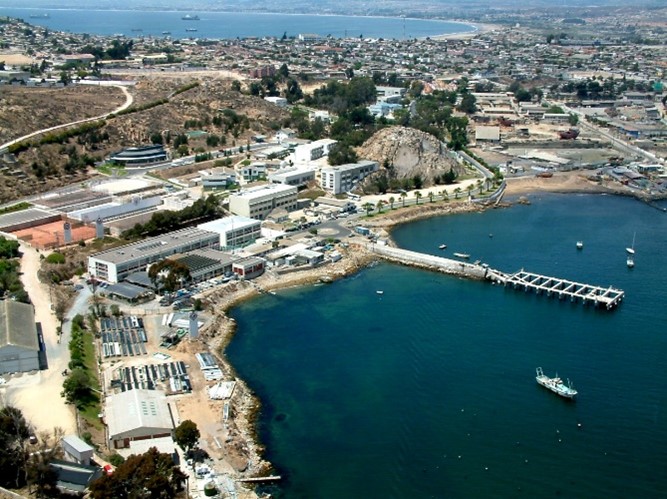
Universidad Católica del Norte , Campus Coquimba/ Chile
My wife comes originally from the North. She has a lot of experience in community work. We met in Santiago while she was working in the Energy Ministry and I was working at several Universities in Santiago. We are looking forward to returning to the North. It is a quiet region and the social cohesion is strong. I will be teaching and researching regulatory frameworks, among others for managing the relationships between companies and local communities. For example how the business community needs to comply with human rights. And I will be lecturing on constitutional law as well as regional planning. The latter exists in the Netherlands, but not so much yet in Chile.”
But it is not only the theoretical knowledge that Esteban wants to convey. He wants to make students aware of the importance of democracy and political engagement.
“I look at politics in the sense of civic development. Politics is more than the electoral process. We need to reintroduce a broader political concept. Learning to deal with people who think differently. Breaking through the bubble culture. Opening up closed communities. Learning how to achieve consensus democracy. And even if you can’t figure it out: use your right to vote.”
What will he take home from Europe? “I like the British and Dutch style of tolerant political debate. People can react openly. In the House of Commons, an open debate is invited. That doesn’t happen in Chile. I take that culture of open debate with me also from my time in Leiden. Being able to have these debates without being afraid of conflict. In Chile, we are traumatised, we are afraid of debate. However, to stay in our bubbles is not a solution. Our society is very complex. A good example is the difficult context of balancing central and decentralised power and civil institutions in South America concerning regional security.”
Esteban is deeply committed to contributing to his home country. He takes inspiration from his family, especially his grandfather. “My grandfather came to Chile from Poland in the early 1930s. He was 19 years old, the son of a modest family, with a relative in Buenos Aires. He crossed the Andes and became a writer. Although he was Jewish, he married a catholic Chilean girl, a Spanish language teacher. He never went back to Poland. His family in Poland did not survive the war. My grandfather fled, for that matter, not only because he was a Jew, but especially because he was in economic need. In Chile, we have Gabriel Mistral and Pablo Neruda as Nobel laureates. My grandfather knew both of them and wrote their biographies. He was a cultural communicator. He started as an agricultural worker. Later, he had a publishing company. Healthy to the end, he died in 2000. When Lech Walesa visited Chile in the 1990s, he gave a medal to my grandfather, also for a book he wrote on Polish history. I was 17 when he died.”
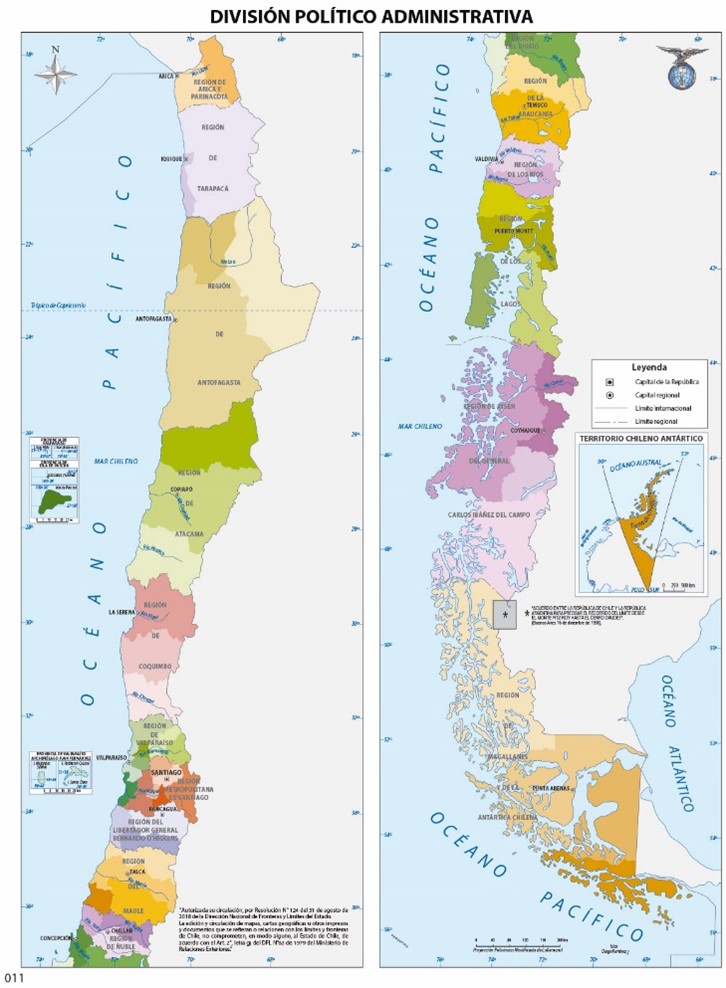
Political-administrative map of Chile
Chile is looking at a historical moment when in May 2023 the members of the Constitutional Council will be newly elected. This election comes in response to the rejection of a proposed constitutional draft in a national referendum held in September 2022. The new Constitutional Council is modelled after the Senate and consists of 50 members who will be elected by regions plus 24 Experts already working on a draft version of the new Constitution. Additionally, the council will have an equal number of men and women. For the first time in history, Chileans from all walks of life and all political factions are participating in a democratic dialogue to develop a new Constitution. The Chilean constitutional process represents a defining moment for Chile. This is for a scholar on constitutional law like Esteban a great opportunity for research and engagement.
“In Chili, the main problem is the protection of social rights. But the government’s role in this is limited. Eduardo Frei wanted a social market economy, and Allende wanted to go even further. Then came the military coup and the free market prevailed. Today, we need the government to take a bigger role in pensions and health. Our health system in Chili is not working well. The elite can afford private treatment, but that is expensive and works only for 20% of the population. Chile is a very unequal country.
You can keep a constitution short in practical and flexible societies. However, in Chili, we come from a legalistic tradition, we follow the rules. We stand in the French-Spanish tradition, where the codes of our constitution are determining our political life. People are used to following the rules. It all has to be quite detailed. I wish we were as self-regulating as Canada, the United Kingdom or the Netherlands.
Constitutional law is very much written in books. In my view, it has to be more than that. Written laws are only part of the story. You need to know how the laws work in practice. You have to experience it.”
Gerelateerde artikelen
Portrait: Between Chile and The Netherlands
Portrait: Between Chile and The Netherlands By Aart van Bochove and Ute Jansen Esteban Szmulewicz, PHD candidate in Leiden, and his family Leiden is a knowledge hub, together with [...]
Column: Draden over de planeet
Column: Draden over de planeet Een biografische column, deze keer. Over politiek, van Chili naar Groningen, naar Leiden. Met een verrassende twist aan het eind. Toen lang geleden in mijn tienerjaren mijn [...]
Meer artikelen
Mevrouw Kuiper stemt tot nadenken
Mevrouw Kuiper stemt tot nadenken Mijn moeder bracht haar laatste jaren door in een zorgcentrum. Zo’n klassiek bejaardenoord: een op z’n kant gezette sigarendoos, kleine studio’s aan lange gangen, een recreatiezaal als [...]
Het verschil tussen aso en adel
Het verschil tussen aso en adel - het verbindend vermogen van een lokale elite Journalist Gertjan van Schoonhoven had een ‘long read’ over Wassenaar in het zomernummer van EW (voorheen Elsevier). Hij citeerde [...]
Column Ondernemersfonds #4: Participatie
Column Ondernemersfonds #4: Participatie en de kunst van het loslaten Het Ondernemersfonds. Het concept is aan onze tekentafel ontstaan. We hebben tientallen fondsen in de startfase mogen begeleiden. En we staan vele [...]
Hoe Blaauwberg de internationale studenten redde
Hoe Blaauwberg de internationale studenten redde Fianne de Boer Ik doe al jaren vrijwilligerswerk voor de Orientation Week Leiden (OWL), de introductieweek van de universiteit Leiden voor internationale studenten. Sinds ik [...]
Lerende netwerken 1: De Basics
Lerende netwerken - een bijzondere vorm van samenwerking | Deel 1: de basics Breng mensen samen, deel ervaringen, en leer samen! Het werken in lerende netwerken is een beproefde methode voor competentieontwikkeling [...]
Colomn Ondernemersfonds #3: betekenis van draagvlak
Column Ondernemersfonds #3: Betekenis van draagvlak Het Ondernemersfonds. Het concept is aan onze tekentafel ontstaan. We hebben tientallen fondsen in de startfase mogen begeleiden. En we staan vele bestaande fondsen bij in ambities [...]
Neem contact op
Neem contact met ons op via bijgaande contactgegevens. Wij komen spoedig met een reactie.
- 071-524 7500
- 06- 1217 2126 (Rob)
Vestwal 2-4 , 2312 NP Leiden

